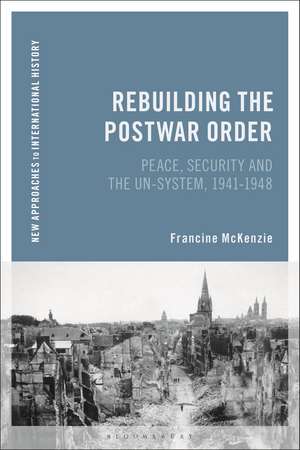Rebuilding the Postwar Order: Peace, Security and the UN-System: New Approaches to International History
Autor Francine McKenzieen Limba Engleză Paperback – 22 feb 2023
| Toate formatele și edițiile | Preț | Express |
|---|---|---|
| Paperback (1) | 134.66 lei 22-36 zile | +26.12 lei 6-12 zile |
| Bloomsbury Publishing – 22 feb 2023 | 134.66 lei 22-36 zile | +26.12 lei 6-12 zile |
| Hardback (1) | 408.00 lei 43-57 zile | +43.18 lei 6-12 zile |
| Bloomsbury Publishing – 22 feb 2023 | 408.00 lei 43-57 zile | +43.18 lei 6-12 zile |
Din seria New Approaches to International History
- 19%
 Preț: 168.15 lei
Preț: 168.15 lei - 8%
 Preț: 154.50 lei
Preț: 154.50 lei -
 Preț: 160.18 lei
Preț: 160.18 lei -
 Preț: 144.84 lei
Preț: 144.84 lei - 7%
 Preț: 149.02 lei
Preț: 149.02 lei - 17%
 Preț: 177.88 lei
Preț: 177.88 lei - 7%
 Preț: 148.75 lei
Preț: 148.75 lei - 8%
 Preț: 153.45 lei
Preț: 153.45 lei - 14%
 Preț: 165.91 lei
Preț: 165.91 lei - 13%
 Preț: 167.24 lei
Preț: 167.24 lei - 13%
 Preț: 180.88 lei
Preț: 180.88 lei - 14%
 Preț: 186.19 lei
Preț: 186.19 lei - 13%
 Preț: 176.74 lei
Preț: 176.74 lei - 14%
 Preț: 147.24 lei
Preț: 147.24 lei - 23%
 Preț: 192.36 lei
Preț: 192.36 lei - 7%
 Preț: 149.02 lei
Preț: 149.02 lei - 7%
 Preț: 148.29 lei
Preț: 148.29 lei - 21%
 Preț: 217.91 lei
Preț: 217.91 lei - 20%
 Preț: 219.46 lei
Preț: 219.46 lei - 13%
 Preț: 180.88 lei
Preț: 180.88 lei - 23%
 Preț: 192.30 lei
Preț: 192.30 lei - 30%
 Preț: 571.01 lei
Preț: 571.01 lei - 14%
 Preț: 539.25 lei
Preț: 539.25 lei - 23%
 Preț: 191.75 lei
Preț: 191.75 lei - 22%
 Preț: 227.23 lei
Preț: 227.23 lei - 13%
 Preț: 201.34 lei
Preț: 201.34 lei - 30%
 Preț: 510.68 lei
Preț: 510.68 lei - 13%
 Preț: 175.85 lei
Preț: 175.85 lei - 22%
 Preț: 656.47 lei
Preț: 656.47 lei
Preț: 134.66 lei
Preț vechi: 145.45 lei
-7% Nou
Puncte Express: 202
Preț estimativ în valută:
25.77€ • 26.98$ • 21.32£
25.77€ • 26.98$ • 21.32£
Carte disponibilă
Livrare economică 17-31 martie
Livrare express 01-07 martie pentru 36.11 lei
Preluare comenzi: 021 569.72.76
Specificații
ISBN-13: 9781472533159
ISBN-10: 1472533151
Pagini: 264
Ilustrații: 9 bw illus
Dimensiuni: 156 x 234 x 25 mm
Greutate: 0.37 kg
Editura: Bloomsbury Publishing
Colecția Bloomsbury Academic
Seria New Approaches to International History
Locul publicării:London, United Kingdom
ISBN-10: 1472533151
Pagini: 264
Ilustrații: 9 bw illus
Dimensiuni: 156 x 234 x 25 mm
Greutate: 0.37 kg
Editura: Bloomsbury Publishing
Colecția Bloomsbury Academic
Seria New Approaches to International History
Locul publicării:London, United Kingdom
Caracteristici
Reveals the origins of institutions upon which the modern world is built, including the United Nations, the IMF, The World Bank, WHO, UNESCO and more.
Notă biografică
Francine McKenzie is a Professor in the Department of History at the University of Western Ontario, Canada. She is an international historian who has published extensively on international organizations, international trade, and global order. Her most recent book is GATT and Global Order in the Postwar Era (2020).
Cuprins
List of FiguresAcknowledgementsList of AbbreviationsIntroduction: Winning the War and Winning the Peace1. First Step on the Road to Peace: The United Nations Relief and Rehabilitation Administration2. National Security Peace: The United Nations Organization3. Peace and Prosperity: The International Monetary Fund, the International Bank for Reconstruction and Development, and the General Agreement on Tariffs and Trade4. Embodied Peace: The Food and Agriculture Organization and the World Health Organization5. Peaceful Minds: The United Nations Educational, Scientific and Cultural Organization6. Peace and Justice: Human RightsConclusion: Fighting for PeaceBibliography
Recenzii
"This impressive book draws on vast reading and research in international history to demonstrate how different conceptions of peace played a decisive role in the emergence of the United Nations and the post-WWII international order. Its multilateral approach provides readers with a truly comprehensive analysis of one of the seminal international developments of the twentieth century."
"More than ever, we need new histories that return us to a critical moment in the invention of the existing international order. Francine McKenzie's meticulous and rich study of the origins of the UN system restores the broad ambitions of the mid-20th century, reminding us of the importance of international institutions, as they were once conceived. There once was a time when the imperative of peace took prime place in international politics- this book brings that time alive for a new generation faced with the multiple challenges of an order newly in diasarray."
"More than ever, we need new histories that return us to a critical moment in the invention of the existing international order. Francine McKenzie's meticulous and rich study of the origins of the UN system restores the broad ambitions of the mid-20th century, reminding us of the importance of international institutions, as they were once conceived. There once was a time when the imperative of peace took prime place in international politics- this book brings that time alive for a new generation faced with the multiple challenges of an order newly in diasarray."
